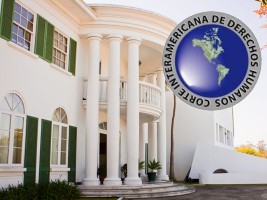|
||||||||||||||||||
| Download the revised decree and electoral calendar, published in the official journal |
|
|
Haiti - Justice : The Dominican State before the Inter-American Court... 07/10/2013 11:30:22
On 8 and 9 October 2013, the Inter-American Court of Human Rights will hold a public hearing in the case "Tide Mendez & Others against the Dominican Republic" (Case No. 12.271, Benito Tide Méndez et al., Dominican Republic), who opposed the Dominican Republic to a group of six families who were victims of arbitrary detention and collective expulsion of Dominican territory by agents of the Dominican migration. The case in judgment is based on the structural discrimination exerted against the Dominican population of Haitian descent and Haitian immigrants who have lived for many years in this country. The Center for Justice and International Law (CEJIL), the Movement of Dominico-Haitian Women (MUDHA), the Support Group for Returnees and Refugees (GARR) and The Human Rights Clinic of the School of Law, the Columbia University in New York will act as representatives of the victims before the American Court at the public hearing to be held in Mexico City in the upcoming extraordinary session of the Court. Evictions reported in this case, are not isolated incidents. They are part of a discriminatory practice of the Dominican state that uses racial profiling based on the alleged Haitian nationality of the victims to arrest them them and detain arbitrarily before deporting them collectively. Between 1999 and 2000, each of the following families involved in the Case : Fils-Aimé, Gélin, Jean, Medina Ferreras, Sension, Alezy, and Charles Pérez, have been victims of this practice of the Dominican State. Colette Lespinasse GARR Coordinator reported that "the victims were arrested and in less than 24 hours, arbitrarily expelled from the Dominican Republic to Haiti, without prior notice or hearing or opportunity to recover their goods or contact their families, a situation that has caused them serious harm, including loss of material losses and intense personal suffering." Cristina Luis Francisca, MUDHA Executive Director, noted that "these acts violate the American Convention on Human Rights every time the evictions have been carried out without any guarantee of a fair trial without the adoption of measures to protect the best interests of children and in the absence of an effective judicial remedy under domestic law that would allow them to challenge the decision of the Dominican authorities to deport them or to question the illegality of their detention." In addition, on September 23, 2013, the Constitutional Court issued a judgment in which it states that foreigners who are in irregular situation in the Dominican Republic, should be considered "in transit" and in accordance with the new Constitution of 2010, as "illegal residents", resulting in the inability for their children to acquire Dominican nationality. Francisco Quintana, CEJIL Program Director for the Andean Region, North America and the Caribbean, said that "the Dominican State, instead of adopting measures to prevent the repetition of such acts of discrimination, has put in place additional measures to strengthen the practice of arbitrary deprivation of nationality by considering people of Haitian descent as foreigners." See also : https://www.haitilibre.com/en/news-9589-haiti-social-creation-of-a-bilateral-senate-committee.html https://www.haitilibre.com/en/news-9559-haiti-news-some-news-here-and-there.html https://www.haitilibre.com/en/news-9563-haiti-social-a-resolution-with-heavy-consequences.html HL/ TB/ HaitiLibre
|
|
|
Why HaitiLibre ? |
Contact us |
Français
Copyright © 2010 - 2026 Haitilibre.com |





